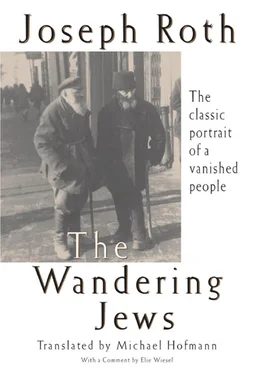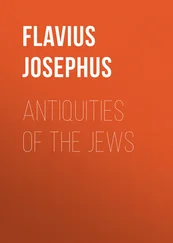One day — and well before the thousand years are up — things will indeed be different in Germany. But neither Jews nor Christians nor indeed civilized Europeans will have any joy with the generation currently in the Hitler Youth. They are Jason’s brood, sown from dragon’s teeth. It will take a whole army of missionaries to baptize the coming generations of German heathens. So long as the Germans are not Christianized, Jews will have little to hope for at their hands.
It therefore seems probable that the Jews will keep their pariah status in German society for many years to come. It seems unduly optimistic to hope that Europe might recover its conscience, that a widely accepted law might overturn the mistaken principle of “noninvolvement,” which merely amplifies the vulgar proverb: “You sweep outside your own door.” This janitorial philosophy has now governed history for the last few decades. Instead, everyone ought to sweep outside one another’s door. It cannot be wrong for me to barge into my neighbor’s house if my neighbor is just about to take an ax to his children. There can be no European or European-Christian morality so long as the principle of “noninvolvement” is respected. What is it that allows European states to go spreading civilization and ethics in foreign parts but not at home? Centuries of civilization are no guarantee that a European people, by some ghastly curse of fate, will not revert to barbarism. Even among the peoples of Africa, which today require the protection¶ of civilized peoples, there must have been some whose millennial civilization one day — or, one century, one might say — was suddenly and inexplicably destroyed. European scholarship tells us as much.
People are forever talking about a “European family of nations.” But if there is to be any truth in those words: Have you ever seen a brother fail to restrain his brother’s hand when he’s about to perpetrate some heinous or idiotic act? Am I really only permitted to teach morality to the black headhunter, and not the white? A chilly sort of family, this “family of nations”!. The father is quite set on only sweeping outside his own door, while the stench from his son’s room rises to high heaven.
10.
I wish I had the grace and the insight to suggest some way out of our present difficulties. But honesty, one of the often unsung muses of the writer, forces me to bring this second foreword of mine to a pessimistic conclusion:
1. Zionism can bring only a partial solution to the Jewish question.
2. Jews will only attain complete equality, and the dignity of external freedom, once their “hostnations” have attained their own inner freedom, as well as the dignity conferred by sympathy for the plight of others.
3. It is — failing some divine intervention — hardly possible to believe that the “host-nations” will find such freedom and such dignity.
Pious Jews may be left with the consolation of the here-after.
As for the rest, it’s “ vae victis .”

*Now Poznan.
†An identification card for stateless persons, introduced in 1922 by the Norwegian polar explorer and civil rights campaigner Fridtjof Nansen (1861–1930), who was awarded the Nobel Peace Prize that same year.
‡The Nuremberg Laws were two measures designed by Hitler and approved by the Nazi Party Conference in September 1935. The first stripped Jews of German citizenship, making them “subjects of the state”; the second forbade marriage or sexual relations between Jews and Aryans. They were followed by further enactments.
§A customs inspector who boards ships and monitors the landing of goods.
¶An ironic reference to Abyssinia, invaded by Italy.
p. iv
Courtesy of Leo Baeck Institute, New York.
p. x
Courtesy of the Yivo Institute for Jewish Research, New York.
p. xxii
Courtesy of Verlag Kiepenheuer & Witsch archive.
p.4
Courtesy of Ullstein Bilderdienst, Berlin.
p. 24
Courtesy of Documentation Photographique Roger-Viollet, Paris.
p. 54
Courtesy of Documentation Photographique Roger-Viollet, Paris.
p. 92
Courtesy of the Institute of Contemporary History and Wiener Library Limited, London.
p. 104
Courtesy of Österreichische Nationalbilbliothek, Vienna.
p. 116
Photograph by Lothar Weil.
p. 120
Photograph by Lothar Weil.
Joseph Roth was born Moses Joseph Roth to Jewish parents on September 2, 1894, in Brody in Galicia, in the extreme east of the then Hapsburg Empire; he died on May 27, 1939, in Paris. He never saw his father — who disappeared before he was born and later died insane — but grew up with his mother and her relatives. After completing school in Brody, he matriculated at the University of Lemberg (variously Lvov or Lviv), before transferring to the University of Vienna in 1914. He served for a year or two with the Austro-Hungarian Army on the Eastern Front — though possibly only as an army journalist or censor. Later he was to write: “My strongest experience was the War and the destruction of my fatherland, the only one I ever had, the Dual Monarchy of Austria-Hungary.”
In 1918 he returned to Vienna, where he began writing for left-wing papers, occasionally as “Red Roth,” “ der rote Roth .” In 1920 he moved to Berlin, and in 1923 he began his distinguished association with the Frankfurter Zeitung . In the following years, he traveled throughout Europe, filing copy for the Frankfurter from the south of France, the USSR, Albania, Germany, Poland, and Italy. He was one of the most distinguished and best-paid journalists of the period — being paid at the dream rate of one Deutschmark per line. Some of his pieces were collected under the title of one of them, The Panopticum on Sunday (1928), while some of his reportage from the Soviet Union went into The Wandering Jews . His gifts of style and perception could, on occasion, overwhelm his subjects, but he was a journalist of singular compassion. He observed and warned of the rising Nazi scene in Germany (Hitler actually appears by name in Roth’s first novel, in 1923), and his 1926 visit to the USSR disabused him of most— but not quite all — of his sympathy for Communism.
When the Nazis took power in Germany in 1933, Roth immediately severed all his ties with the country. He lived in Paris — where he had been based for some years — but also in Amsterdam, Ostend, and the south of France, and wrote for émigré publications. His royalist politics were mainly a mask for his pessimism; his last article was called “Goethe’s Oak at Buchenwald.” His final years were difficult; he moved from hotel to hotel, drinking heavily, worried about money and the future. What precipitated his final collapse was hearing the news that the playwright Ernst Toller had hanged himself in New York. An invitation from the American PEN Club (the organization that had brought Thomas Mann and many others to the States) was found among Roth’s papers. It is tantalizing but ultimately impossible to imagine him taking ship to the New World, and continuing to live and to write: His world was the old one, and he’d used it all up.
Roth’s fiction came into being alongside his journalism, and in the same way: at café tables, at odd hours and all hours, peripatetically, chaotically, charmedly. His first novel , The Spider’s Web , was published in installments in 1923. There followed Hotel Savoy and Rebellion (both 1924), hard-hitting books about contemporary society and politics; then Flight Without End, Zipper and His Father , and Right and Left (all Heimkehrerromane —novels about soldiers returning home after the war). Job (1930) was his first book to draw considerably on his Jewish past in the East. The Radetzky March (1932) has the biggest scope of all his books and is commonly reckoned his masterpiece. There follow the books he wrote in exile, books with a stronger fabulist streak in them, full of melancholy beauty: Tarabas, The Hundred Days, Confession of a Murderer, Weights and Measures, The Emperor’s Tomb, and The Tale of the 1002nd Night.
Читать дальше













